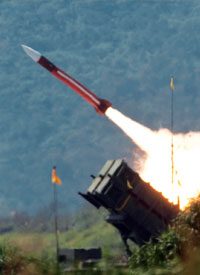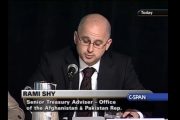
A secret FBI videotape showing the transfer of classified military documents to a communist Chinese agent was released in February to the world, providing a brief peek at the shadowy world of espionage against America. Pentagon analyst Gregg Bergersen with the Defense Security Cooperation Agency is shown receiving a wad of bills and telling People’s Republic of China spy Tai Shen Kuo that he’s “very reticent” to let him have the information “because it’s all classified.”
The documents included sensitive material about weapons sales to Taiwan — a U.S. ally, which the communist regime considers a breakaway province to be conquered eventually — and details of a communications system. Bergersen told Kuo: “You can take all the notes you want … but if it ever fell into the wrong hands … then I would be fired for sure. I’d go to jail because I violated all the rules.” He was eventually convicted and sentenced to five years, while Kuo received a 15-year sentence. The investigation also identified other sources who were providing secrets about American space and naval technology to the PRC.
In February, another Chinese spy was sentenced to 15 years in jail for stealing sensitive secrets from his former employers — Boeing and Rockwell International — and passing them to the communist regime. Engineer Dongfan “Greg” Chung reportedly gave up trade secrets about American space shuttles, military aircraft, and even the Delta IV rocket. Though Chung was 73 years old, the judge said he handed out the possible life sentence as a message to the Chinese government: “Stop sending your spies here.”
Chung was reportedly aided in his crimes by Chi Mak, a former defense-contractor engineer. Mak was convicted of conspiring to pass sensitive military technology to the PRC, including information on Navy ships, nuclear submarines, and more. “We will never know the full extent of the damage that Mr. Mak has done to our national security,” wrote the judge, who sentenced Mak to 24 years. His family later pled guilty to related criminal charges.
These are just a few of the more recently convicted PRC spies operating in the United States. The FBI has arrested dozens of Chinese on American soil in recent years for involvement in espionage operations on behalf of the communist regime. And according to various reports, there are close to 500 similar investigations ongoing. The problem is indeed enormous.
Extent and Methods of Spying
Of course, the Chinese government vehemently denies that it is engaged in espionage. “Some people have always favored making up Chinese spy stories for sensationalism,” PRC Foreign Ministry spokesperson Ma Zhaoxu told reporters after the sentencing of Dongfan “Greg” Chung for espionage.
Other communist officials claim that the accusations of spying are designed to “defame China.” Peng Bo with the “Internet Bureau” of the Chinese Information Office denied involvement in recent cyber attacks blamed on the regime: “The government has never supported or been involved in cyber attacks, and it will never do so,” he told the state-run Xinhua, adding that the charges were “sheer nonsense” and “groundless.” But nobody really believes that, not any more than they believe Chairman Mao was an “agrarian reformer.”
French author Roger Faligot, who has written dozens of espionage-related books, including The Chinese Secret Services From Mao to the Olympic Games, claims there are some two million Chinese spies working with the communist state’s security apparatus. The regime has countless agencies engaged in intelligence gathering, including the Ministry of State Security; various military intelligence agencies; multiple industrial, political, and economic espionage departments; and more.
Hiding behind “diplomatic immunity” and using blackmail, bribery, special privileges, strategic “business” partnerships, cyber attacks, and a wide array of other methods, China’s spies have been extremely successful in their efforts.
“The Chinese are the biggest problem we have with respect to the level of effort that they’re devoting against us versus the level of attention we are giving to them,” former U.S. counterintelligence chief Michelle Van Cleave told CBS, explaining that it was impossible to know the true magnitude of the problem. And she isn’t the only concerned American official.
In its 2007 annual report to Congress on the military power of the PRC, the Department of Defense explained that Chinese espionage is a critical threat. “Several high profile legal cases highlight China’s efforts to obtain sensitive U.S. technologies (e.g., missile, imaging, semiconductor, and submarine) illegally by targeting well-placed scientists and businessmen,” explained the report. “U.S. Immigration and Customs Enforcement (ICE) officials have rated China’s aggressive and wide-ranging espionage as the leading threat to U.S. technology. Since 2000, ICE has initiated more than 400 investigations involving the illicit export of U.S. arms and technologies to China.”
American military and government-related intelligence is one of the top priorities for Chinese intelligence services. Fengzhi Li, a former spy recruiter for the communist regime who defected and is now seeking asylum in the United States, told CBS’ 60 Minutes that “without a doubt,” China’s Ministry of State Security dedicates most of its efforts to spying on America.
Chinese espionage against the U.S. military goes back a long way, too. It has even been aided in recent decades by some top American officials, including a former U.S. President. Bill Clinton helped the hostile communist government access some of the most sensitive American military technology while covering up various crimes for the regime and its agents. As documented in the February 15, 1999 “Chinagate: Treason in the White House” issue of The New American, Clinton’s collaboration was secured in exchange for massive unlawful campaign contributions.
“President Clinton promised to restrain those who ordered the Tiananmen Square massacre, but he has now allowed these men whose hands are stained with the blood of martyrs of freedom into the highest reaches of our military defenses, and made available to them significant portions of our advanced military technology,” wrote former Joint Chiefs of Staff Chairman Admiral Thomas Moorer.
Chinese espionage against the U.S. government and armed forces has been so successful that it may seem there cannot be a whole lot left for the regime to steal. A late-1990s congressional committee found that the Chinese regime already possessed vast amounts of America’s most sensitive military information, including the designs of American thermonuclear weapons.
But military and government secrets aren’t the only things the regime is seeking. Economic espionage has become a huge drain on the American economy. “The Cold War isn’t over, it has just moved into a new arena: the global marketplace,” notes the FBI on its website. The agency estimates that “every year billions of U.S. dollars are lost to foreign competitors who deliberately target economic intelligence in flourishing U.S. industries and technologies, and who cull intelligence out of shelved technologies by exploiting open source and classified information known as trade secrets.” Current estimates on the cost of economic espionage to U.S. businesses are difficult to find, but FBI Director Robert Mueller told the Detroit Economic Club in 2003 that “theft of trade secrets and critical technologies — what we call economic espionage — costs our nation upwards of $250 billion a year.” And China is the main problem.
The examples of Chinese economic espionage aren’t new either. From spying on American firms in Silicon Valley to stealing proprietary software from foreign firms in China, the regime does it all. Some analysts, like cyber-security expert Alan Paller of the SANS (SysAdmin, Audit, Network, Security) Institute, claim that every foreign company with operations in China has probably had its computer networks compromised by the communist government.
Earlier this year, the family-owned American software firm Cybersitter initiated a federal lawsuit against the PRC and two contractors for stealing its proprietary anti-pornography software. The regime used it to censor the Internet in China. “I don’t think I have ever seen such clear-cut stealing,” said an attorney for the company. The estimated damages to Cybersitter: over $2 billion.
Then there is the spying on dissidents. Owing to the totalitarian nature of the Chinese regime, countless people have fled the country. But it turns out they aren’t safe no matter where they go. Fengzhi Li, the former Chinese intelligence officer who defected and is seeking asylum in the United States, told a news conference last year after speaking before Congress that the communist government spies on spiritual groups, dissidents, and “aggrieved poor people” overseas.
Former Chinese diplomat Chen Yonglin, who was based in Australia and also recently defected, told New Tang Dynasty Television about some of the methods used by the communist regime to control Chinese populations abroad in order to further communist aims. These include setting up “fake” umbrella organizations to create the illusion that all Chinese living outside China think like the Chinese Communist Party. He said officials would send students and other spies to Chinese human-rights demonstrations to act as agents provocateurs and compile lists of who attended.
“Basically, the Chinese student organization in every school is under [Chinese Communist Party] control, other than the ones started by individuals with views that disagree with the CCP’s,” he said. “Their operation funds mostly come from the education department of the consulate, and meetings are held on consulate grounds. The representatives and the chair persons in the student organizations are appointed by the consulate.” Many of the groups’ websites even openly acknowledge the connection.
In his tenure as a high-level Chinese diplomat in Australia, Yonglin spent much of his time keeping tabs on Falun Gong practitioners and waging a propaganda war against them. He revealed that there was a 1,000-member-strong Chinese spy network operating in the country.
Indeed, the regime expends a great deal of effort spying on Chinese dissidents in Europe as well. In early March, a Swedish court convicted Babur Maihesuti of aggravated illegal espionage against members of the persecuted Chinese-minority Uighur community exiled in Sweden. According to the court, he gathered information regarding the travel habits, health, refugee status, and political inclination of Uighurs and transferred it to the communist regime.
One of the most serious espionage threats from the Chinese government is found on college campuses, according to experts, officials, and defectors. There are an estimated 150,000 Chinese students studying at American universities, according to Time magazine. And according to officials, the institutions are a prime target for spies seeking sensitive technological information. Of course, not all Chinese students in America are here to spy or steal information. Many of them are here in search of a better life away from the pervasive thumb of communist authoritarianism. But not all of them. According to a survey by China’s official news organ, 81 percent of Chinese students in America plan to return home after receiving their U.S. education.
“Everything that’s needed for a modern industrial military state is leaving here, and going there,” University of Michigan aerospace engineering professor Bill Kauffman explained in a video interview with investigative reporter Vince Wade about the problem.
Ultimate Goals
So what are the aims of the communist regime’s espionage activities? Different experts interviewed by The New American for this story expressed various opinions, but none of the theories are good.
“The Chinese are assembling a comprehensive ‘map’ of the U.S. government and economy while simultaneously looting our high technology for their own industrial and economic purposes,” explained Charles Viar, a former U.S. counterintelligence official and the chair of the Center for Intelligence Studies. The goal, he said, is “to achieve international hegemony — peacefully, if possible. At minimal military cost if not.”
“The Chinese are moving forward with building an aircraft carrier, they’re establishing ports all over, and advanced missile systems and satellite systems,” said Roger Canfield, Ph.D., author of several books on the Chinese regime and its espionage operations, including China’s Trojan Horses: Red Chinese Soldiers, Sailors, Students, Scientists and Spies Occupy America’s Homeland. He told The New American that the long-term goal was military modernization on a scale that would someday be able to challenge American power.
Chinese dissidents who have experienced the regime’s brutality are acutely aware of the possibilities for danger. “The Communist Party wants to survive, and it will steal for survival — it’s self-interest,” explained Samuel Zhou, the executive vice president of New Tang Dynasty Television and a native-born Chinese who emigrated to America after the Tiananmen Square massacre. In an interview with The New American, he explained: “They need to grow the economy to defend themselves from the mass[es] … so they need economic information. And then there’s Taiwan of course…. Whether they have the power to conquer the world — that’s still far away. But they do want to have at least this kind of control — they want to control others, and once they have this information, they have ways to manipulate people…. I don’t want to make a prediction now, but communism is communism — they have no principles. If they can kill tens of millions of their own people, what could they do to the world? It’s kind of obvious.”
Former Canadian Minister of Parliament David Kilgour, also a former Minister of State for the Asia-Pacific region, put it bluntly. “There’s absolutely no doubt that their long term goal is world domination and to put the United States — as much as they can — out of business, and to become the world’s superpower,” he told The New American. “They want to run the whole planet.”
And indeed, the communist government has given good indications of their way of thinking. Top Chinese military officials have openly discussed destroying American cities with nuclear weapons, especially if the United States intervenes militarily on behalf of Taiwan. “If the Americans draw their missiles and position-guided ammunition on to the target zone on China’s territory, I think we will have to respond with nuclear weapons,” said Chinese Major General Zhu Chenghu in a speech. “We Chinese will prepare ourselves for the destruction of all of the cities east of Xian. Of course, the Americans will have to be prepared that hundreds of cities will be destroyed by the Chinese.”
What It All Means
Most of the analysts who discussed with The New American the effectiveness of law enforcement and counterintelligence agreed that the U.S. government was not doing enough to counter the threat. “American counterespionage — the FBI — has been largely ineffective against the Chinese and, indeed, the Chinese have twice managed to suborn FBI agents deployed against them (using sexual lures),” said Charles Viar of the Center for Intelligence Studies in an e-mail to The New American.
In its recommendations to Congress, the U.S.-China Economic and Security Review Commission suggested an assessment of export control enforcement and counterintelligence efforts, and possibly providing more funding for operations to prevent illicit technology transfer to the regime or its industrial espionage programs. It also recommended a review of American military and intelligence computer networks.
Some of the methods suggested by experts interviewed for this story include properly vetting Chinese students aiming to study in American universities, tightening export controls on sensitive technology, and actively enforcing the restrictions, among others proposals. Increasing resources to counterespionage programs would help, too.



